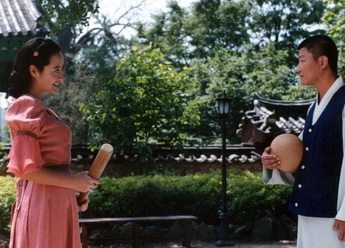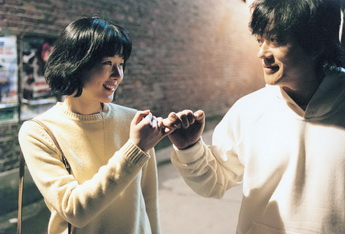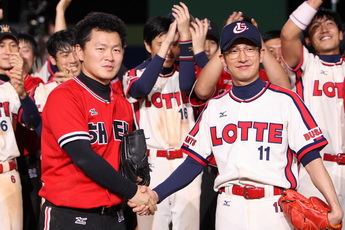This was originally written for the website APG SPORTS which focused on East Asian sport. Sadly, that website is no more. It has been published here on Koreanfilm.org since that website is no longer accessible.
Taking in a Few South Korean Baseball Films
by Adam Hartzell
"Baseball is all about stories, many of which are even true."
- George Vecsey from Baseball: A History of America's Favorite Game
My interest in sports films lies in the stories they enable a filmmaker to tell. In the case of real life events, fidelity to facts is important and it is instructive to point out where narratives stray and why, especially when such is done to cover up inconvenient facts. But as with historical novels, screenwriters and directors can step away from what actually happened so that an effort can be made to entertain and tell a greater artistic truth. Characters can be composites, actions can be conflated, all in order to move the story along or set the tone of the times. I see such stretches from the events like the pinch-runners or pinch-hitters of plot points. Sports are organized play, so directors and screenwriters and actors can have fun too. And in the case of South Korean baseball films, if baseball couldn't throw a curve every so often, it wouldn't be the same game, so why should movies about baseball be any different.
These managerial decisions are why films inspired by historical moments often tell us more about the time and place they were made in than about the time and place being portrayed. As a result, one shouldn't expect baseball movies in South Korea to follow the script of baseball films from the USA. As South Korean cinema has re-glamorized itself in the 2000s(1), South Korea has occasionally been utilizing the roughness of the baseball diamond to tell its own myths.
 Let's start with baseball's introduction onto the peninsula, portrayed comically in Kim Hyun-seok's YMCA Baseball Team (Kim Hyun-seok, 2007). Although basketball and football (aka soccer) were more enthusiastically embraced initially by Koreans, which YMCA Baseball Team demonstrates by beginning the film with a football match played with a blown-up animal bladder, baseball would soon invigorate certain segments of the populace as players and spectators after it was introduced to Korea by Christian missionary Philip Loring Gillett in roughly 1903/1904. YMCA Baseball Team isn't intended to be completely historically accurate, but the baseball team depicted in the film, the Hansong YMCA team in Seoul, is recognized as the first baseball team made up of Koreans.
Let's start with baseball's introduction onto the peninsula, portrayed comically in Kim Hyun-seok's YMCA Baseball Team (Kim Hyun-seok, 2007). Although basketball and football (aka soccer) were more enthusiastically embraced initially by Koreans, which YMCA Baseball Team demonstrates by beginning the film with a football match played with a blown-up animal bladder, baseball would soon invigorate certain segments of the populace as players and spectators after it was introduced to Korea by Christian missionary Philip Loring Gillett in roughly 1903/1904. YMCA Baseball Team isn't intended to be completely historically accurate, but the baseball team depicted in the film, the Hansong YMCA team in Seoul, is recognized as the first baseball team made up of Koreans.
The film features one of South Korea's finest actors, Song Kang-ho, who plays Lee Ho-chang, a scholar's son. This means he must hide his extracurricular sporting pursuits because the yangban class shunned physical exertion.(2) As a result, the 'Christian manliness' that demanded bodily discipline was at odds with yangban masculinity, which is why Lee's father is adamantly against his son's participation in sport. Modern sport and western ways in general "were sharply contested by people who perceived the encroachment of these new cultural practices as a form of cultural imperialism."(3) The anxieties caused by the father-traditionalist/son-modernist binary is one of the tensions outside the ballpark that propels the narrative along.
In addition to the scholar, there is the son of a Japanese collaborator, Ryu Kwang-tae (played by a young Hwang Jung-min, who in 2013 was polled as South Korea's most popular actor), and two underground leaders of the Korean resistance movement, Min Jeong-rim (Kim Hye-su) and Oh Dae-hyun (Kim Ju-hyeok). These players allow for the colonial history to be told upon the baseball field, for the penultimate game that closes out the film is against a team of Japanese military men. In this case, there is truth within this storytelling since sporting events enabled the expression of anti-colonial resistance, of desires for Korean independence.(4) Herein lies the second tension, battle on the playing field against one's colonizers, a factor that has fueled other sports films, such as the Indian cricket film Lagaan (Ashutosh Gowariker, 2001). As a result we have two major tensions that represent how ". . . Sport can be understood as having a double-edged potential as an institutionalized practice for incorporation into empire and as a site for resistance to colonization."(5)
Along the way, we have moments representing baseball everywhere, as well as aspects specific to Korean baseball and Major League Baseball in North America. Regardless of where you play baseball, you eventually have to learn how to hit a curve to make it in the big leagues. This harsh reality that has sent many a promising hitter sulking away from the batter's box is utilized in YMCA Baseball Team for delightful comedic effect. As for matters specific to Korea, there's the use of a byeonsa narrator play-by-playing the game. Although byeonsa adapted their talents to the silent screen from the stage, I know of no such credited use of them for baseball games, but the inclusion of a byeonsa is a nice nod to the time. And his getting drunk on (likely) makgeolli near the end of the game could be seen as an allusion to the famed antics of the Chicago Cubs announcer, Harry Caray. Although I don't know about the legitimacy of that being an allusion, director Kim did confirm when screening his film in San Francisco that the home run splashing near a fisherman's boat was indeed a reference to the famed kayaks and boats awaiting home runs outside of the ballpark where the San Francisco Giants play.(6)
 The inclusion of a female coach, Min Jeong-rim, in YMCA Baseball Team underscores an interesting aspect of four of the five South Korean baseball films I am discussing here. Although women only feature prominently in one of these bastions of male prowess, the placement of key female characters in a few of these films allows for something different than what we've come to expect from sports films on male sports. Min is a 'love interest' in some ways. Slugger Lee pines for her affection and there might be something going on with her and pitcher Oh. Yet her romantic involvement with anyone is left ambiguous enough to digress from the expected female love interest in sports films as recent as Draft Day (Ivan Reitman, 2014).(7) A film I will discuss more about later, Perfect Game (Park Hee-kon, 2011), includes a female reporter who is allowed by the script to just be a reporter. She doesn't need to offer herself to any of the players even when they drop their towels. And for all of Mr. Go's flaws, the teenage Chinese girl companion for the CGI-ed gorilla is full of confidence and doesn't need a boy to validate her existence. But the film I want to discuss now, Mr. Gam's Victory (Kim Jong-hyun, 2004), which includes a cameo from YMCA Baseball Team director Kim, is partly significant because of how it works in the sub-plot of budding actress Park Eun-A (Yoon Jin-seo) along with the main focus of the film, southpaw Gam Sa-yong (Lee Beom-soo). By paralleling Park's efforts to become an actress with Gam's efforts to become a successful pitcher, the film is providing, if not equal time, at least significant consideration for differently-gendered professional pursuits that emphasize performance of ones body. Gam is trying to receive masculine recognition through his exploits on the field while Park is doing the same in a feminine fold.
The inclusion of a female coach, Min Jeong-rim, in YMCA Baseball Team underscores an interesting aspect of four of the five South Korean baseball films I am discussing here. Although women only feature prominently in one of these bastions of male prowess, the placement of key female characters in a few of these films allows for something different than what we've come to expect from sports films on male sports. Min is a 'love interest' in some ways. Slugger Lee pines for her affection and there might be something going on with her and pitcher Oh. Yet her romantic involvement with anyone is left ambiguous enough to digress from the expected female love interest in sports films as recent as Draft Day (Ivan Reitman, 2014).(7) A film I will discuss more about later, Perfect Game (Park Hee-kon, 2011), includes a female reporter who is allowed by the script to just be a reporter. She doesn't need to offer herself to any of the players even when they drop their towels. And for all of Mr. Go's flaws, the teenage Chinese girl companion for the CGI-ed gorilla is full of confidence and doesn't need a boy to validate her existence. But the film I want to discuss now, Mr. Gam's Victory (Kim Jong-hyun, 2004), which includes a cameo from YMCA Baseball Team director Kim, is partly significant because of how it works in the sub-plot of budding actress Park Eun-A (Yoon Jin-seo) along with the main focus of the film, southpaw Gam Sa-yong (Lee Beom-soo). By paralleling Park's efforts to become an actress with Gam's efforts to become a successful pitcher, the film is providing, if not equal time, at least significant consideration for differently-gendered professional pursuits that emphasize performance of ones body. Gam is trying to receive masculine recognition through his exploits on the field while Park is doing the same in a feminine fold.
The actual historical period depicted in Mr. Gam's Victory incorporates the beginning of the Korean Baseball Organization (KBO), the governing body of the professional baseball league in South Korea. As Joseph A. Reaves argues in his chapter on Korean baseball in Taking in a Game: A History of Baseball in Asia,
"The most distinguishing element of Korean baseball is the level of political involvement."(8)
Although I see plenty of political involvement in sport in the USA and elsewhere, (read anything by sportswriter Dave Zirin for proof of the constant connections between sports and politics), Reaves discusses how each of the six charter clubs were owned by chaebols that had major ties to the government of President Chun Doo-hwan. The first KBO commissioner, Suh Jyoung-chul, did have baseball bona fides, having played for Tachi Commercial High School in Japan and having managed the Korean Army baseball team, but he was also a former defense minister and president of the Korea Anti-Communist League. As a result, the government's hands in the creation of professional baseball were apparent from the beginning in 1982. The promotion of a game in 1986 between the Gwangju-based Haitai Tigers (before they became the Kia Tigers) and OB Bears (after the latter had moved from Daejeon to Seoul and before they were renamed the Doosan Bears), demonstrated further the hand in glove possibilities of politics and sports. This promotion was part of President Chun's '3S' policy to encourage the production and consumption of 'sports, screen, and sex' to distract from the country's political unrest and his administration's human rights abuses. Although not the same game as that mentioned above, a similar 3S-promotion as political distraction is depicted in Perfect Game, this time the Haitai Tigers are playing the Busan-based Lotte Giants. The politics are not the primary focus, but the film does not ignore how this event was utilized for political leverage.
 The primary focus of Perfect Game is the real life pitching rivalry between Choi Dong-won of the Giants and Sun Dong-ryul of the Tigers. (Choi is played by Cho Seung-woo in his second baseball film, having been on the field in YMCA Baseball Team. Sun is played by Yang Dong-geun.) Part of the film's charm is that Choi and Sun are not portrayed as bitter enemies. They are rivals who respect each other, or at least in Choi's case, grows to respect Sun. The positive side of competition is presented in Perfect Game, the rivalry used as motivation for the betterment of both parties as opposed to tearing down ones opponent.
The primary focus of Perfect Game is the real life pitching rivalry between Choi Dong-won of the Giants and Sun Dong-ryul of the Tigers. (Choi is played by Cho Seung-woo in his second baseball film, having been on the field in YMCA Baseball Team. Sun is played by Yang Dong-geun.) Part of the film's charm is that Choi and Sun are not portrayed as bitter enemies. They are rivals who respect each other, or at least in Choi's case, grows to respect Sun. The positive side of competition is presented in Perfect Game, the rivalry used as motivation for the betterment of both parties as opposed to tearing down ones opponent.
YMCA Baseball Team provides an even more intriguing relationship between rivals. This rivalry is more political than athletic and persists between players on the same team, between pitcher and resistance fighter Oh, and teammate and son of a Japanese collaborator Ryu. Before the late 90's when censorship of cinema was loosened in South Korea, a character like Ryu would have had to experience some type of comeuppance. YMCA Baseball Team takes a different approach.
Speaking of signs, Kang Woo-suk's film GLove (Kang Woo-suk. 2011) makes a connection between baseball signs and sign language. (The film title is intentionally spelled with the first two letters capital.) GLove fits itself around a true story involving a deaf high school baseball team, Chungju Sung-Shim located in Chungju City, North Chungcheong Province, that was also featured as the topic of a TV mini-series. An aspect of GLove's plot involves three deaf players developing their own signs for plays. I am not aware of whether this is based on what really happened with this deaf South Korean high school team, but this scene resonates with U.S. baseball lore, since the great deaf player William Ellsworth Hoy, is often credited as the originator of signs in baseball. There isn't any definitive historical record that Hoy really did have this influence on baseball, but the myth still has power, as does the eventual impact of the signs developed by the deaf players in GLove.
The film opens up some intriguing, although likely unintentional, interpretations. When applying the social model of disability to the deaf, we see that the deaf only become 'disabled' when refused access to sign language and forced to survive in communities where the only option is verbalizing a language. The social model of disability opens up the possibility of seeing the deaf as similar to other linguistic minorities, sharing the obstacles and direct or indirect oppression such communities face. With this background knowledge, the games between deaf and hearing schools in GLove can be seen as politically similar to those played between colonized and colonizer on the fields of YMCA Baseball Team.
The problem with GLove is the same problem that persists regarding many films featuring the disabled, director Kang chooses to depict the deaf rather than work with actual deaf actors. At the very least, I wish Kang had considered Lim Eun-kyeong for the role. As a CoDA (Child of Deaf Adults) fluent in Korean Sign Language, she could have added much more to the character of Yoo-Sun who, contrary to the female roles described above, is clearly required as a romantic subplot.(9) In spite of this flaw, the film is an entertaining one and actor Jeong Jae-young is excellent as Kim Sang-nam, the obstinate LG Twins pitcher who has thrown one fit too many for the KBO and has to rehabilitate his image by coaching the team.
 All the films I've discussed at length so far are decent films. I don't feel any would be a waste of time. However, I can't speak that positively about Mr. Go (Kim Yong-hwa, 2013). But Mr. Go did have me realize something interesting that is missing from South Korean baseball films - the non-Korean players. Since three of the films discussed here were from South Korea's past before foreign players really started to participate, (although there is Gillett in YMCA Baseball Team), and one film is about a South Korean high school, this is understandable. Still, so far Mr. Go is the only film I know to include a foreign player, eventually two foreign players, who just happen to be, uhm, gorillas.(10)
All the films I've discussed at length so far are decent films. I don't feel any would be a waste of time. However, I can't speak that positively about Mr. Go (Kim Yong-hwa, 2013). But Mr. Go did have me realize something interesting that is missing from South Korean baseball films - the non-Korean players. Since three of the films discussed here were from South Korea's past before foreign players really started to participate, (although there is Gillett in YMCA Baseball Team), and one film is about a South Korean high school, this is understandable. Still, so far Mr. Go is the only film I know to include a foreign player, eventually two foreign players, who just happen to be, uhm, gorillas.(10)
Based on a popular South Korean comic, the Chinese co-production with dialogue in three Asian languages (mostly Korean and Chinese, but some Japanese too) and a theme song sung by a member (Kim Tae-yeon) of the popular K-pop girl group Girls' Generation, the target market for Mr. Go was clearly focused regionally in Asia. But in spite of that and its technical wizardry, Mr. Go simply didn't get going in South Korea partially due to the competition on the weekend of its release. However, the Chinese release was clearly successful, achieving the highest single-day box office receipts of any South Korean film in China.
Like the horrible film D-War (Shim Hyung-rae, 2007) or the less horrible but still bad Haeundae (Youn Je-gyun, 2009), Mr. Go is primarily a venture in CGI prowess, the first South Korean film shot entirely in 3D. The gorilla's movements, the live actor interactions, and the crowded stadium scenes are all quite impressive. Besides the cinematic circus tricks, baseball fans might appreciate the brief cameos of MLB talents Ryu Hyun-jin and Choo Shin-soo. The KBO and Japanese Professional Baseball were involved in this film, although both appear to allow themselves to portrayed in occasionally disparaging ways. The KBO even allowing an association with illegal gambling, although safely secured away from the stadiums in the isolated outposts of Chinese circuses.(11)
In the end, whether or not another Mr. Go will be given the signal to head for second base would be decided more on its success in China than South Korea. As for future baseball films in South Korea, I hope for more highlighting the best aspects of the no-Go films mentioned here. I look forward to more films that pay attention to how what happens off the field impacts what happens on the field. I am anxious to see films that don't treat women as trophies but enable opportunities for women to contribute to the plot as their own agents. And I anticipate more films that touch on aspects particular to how the game is played in South Korea yet still resonate with all fans of the pastime. Because it is past time for baseball to be seen as more than solely an American pastime. South Korean baseball films are an opportunity to expand the myths that baseball can tell.
ENDNOTES
(1) The first instance of film glamour in South Korea is the "Golden Age" from 1955-1972. If you have yet to seek out films from these years, do yourself a favor and check them out. For some suggestions, go here - http://www.koreanfilm.org/kfilm60s.html
(2) For those who saw the period drama The Fatal Encounter (2014), this is also why Hyun Bin's character King Jeongjo had to perform his push-ups and other strength exercises behind closed doors.
(3) Rachael Miyung Joo, Transnational Sport: Gender, Media, and Global Korea (Duke University Press, 2012), p. 39-40. This book is excellent and required reading for anyone interested in South Korean modern sports.
(4) Ibid.
(5) Ibid, p 41.
(6) The stadium that is, by the way, 4 long blocks from my office.
(7) Indulge me for a moment and allow me to mention how annoying it was, as a former Clevelander, to see Draft Day have characters who we are led to believe were reared in Cleveland calling carbonated sugar water 'soda' rather than 'pop', the accepted term in the region? Let me also say, on a positive note, that Draft Day was the second Kevin Costner sports film to feature a reference to my hometown, Berea, Ohio. Although land annexed from neighboring Brook Park after I left Berea, the Browns' head office and training facility is still in Berea, Ohio. (Their head office used to be across the street from my high school.) The other Berea-referencing Costner sports film is For The Love Of The Game (Sam Raimi, 1999), where Jack Spellman is played by my childhood friend Mike Buddie who was also Costner's pitching coach for the film. Buddie was a middle-reliever for both the New York Yankees (1998-1999) and Milwaukee Brewers (2000-2002).
(8) When reading Reaves' chapter on South Korean baseball in Taking in a Game: A History of Baseball in Asia (University of Nebraska Press, 2002), I had this feeling that I'd read it before. It was then that I realized I had read much of it before in a later volume, Baseball Without Borders: An International Pastime (Ed. George Gmelch, University of Nebraska Press, 2006). Reaves' chapter on South Korean baseball for that 2006 volume is an adaptation of his 2002 book's chapter but is not mentioned as such in the 2006 volume. Both are valuable books for those interested in the global impact of baseball. I provide this footnote to help with any confusion regarding which book I reference for that quote should a reader have only read the 2006 volume and not the 2002 book.
(9) A recent June 2nd article in a South Korean Sports paper announced that Lim will soon resume acting. The article (in Korean) can be found here - http://isplus.live.joins.com/news/article/article.asp?total_id=14853522&cloc=cloc
(10) Of course, I might find non-Korean players in the 3 other South Korean baseball films I know of which I have yet to see - Lee Jang-ho's Baseball Team (Lee Jang-ho, 1986), Bunt (Park Gyu-tae, 2007) and Scout (Kim Hyun-seok, 2007).
(11) Fans of Australian and/or New Zealand cricket will find an interesting similarity, but I seriously doubt it's an allusion, in one of Mr. Go's plot points to an infamous incident in 1981 in a One Day International match between the two nations.